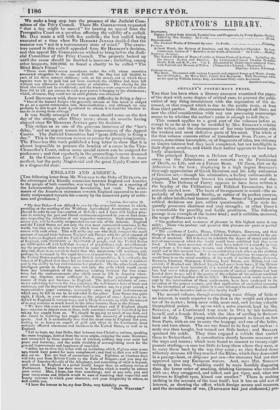ENGLAND AND AMERICA.
[THE following letter from Mr. Wm.'s= to the Duke of RUTLAND, on the advantages of a friendly connexion between England and America to the people of both countries, was read by his Grace at a meeting of the Leicestershire Agricultural Association, last ,veek. The senti- ments of the American statesman towards England appeared to be cor- dially reciprocated towards his country by the numerous party of noble-
men and gentlemen.]
Loudon, November 16.
"My dear Duke—I am obliged to von for the respectful manner in which, presiding at the meeting of the Waltham Agricultural As.ewiation, you were pleased to refer to our conversation at Belt-ow; and I have still higher plea- sure in noticing the just and liberal sentiments expressed by you on that occa- sion respecting the relations of our respective countries. Such sentiments, I assure you, Willie heartily reciprocated on our side of the Atlantic. England and the United States are not only the two most commercial countries in the world, but they are also those two which have the greatest degree of inter- course with each other. This will strike any one who shall compare the small amount of annual trade between England and France with the great amount of that between England and the United States; and yet France is within sight of England, with 33,000,000 or 34,000,000 of people, inel the United States are 3,ono miles off, with half that amount of population ; and, notwithstand- ing the progress which may be expected in some branches of inaminfo'tures in America, there is no reason to doubt that this intercourse will continue, and, perhaps, be increased by time rapid increase of population in A my,:ica. While the United States continue to import British commoditics, it 1.3 evidently the interest of England that those her customers should iecrease both in nmnbers and in the ability to buy and consume her products. On the other hand, every intelligent person in America sees, not only time evils which would ensue from any interruption of the harmony existing between the two coun- tries, but the embarrassments also which must be felt in America when- ever any disasters occur sufficient to derange the general prosperous course of trade and business in England. The intimate relations of com- merce subsisting between the two countrks, the well-known laws of trade and exchange, and the important fact that both countries use, to a great extent, a representative paper currency, necessarily cause any great embarrassment which may be felt in one to be extended to the other. Your Grace was quite right, I think, in your observations on the subject of COTII AllIcriC3 is in- debted to England in various ways, and is likely to remain so, while the interest of mmey remains so much lower in the latter country than in the former.
" We have this year a most abundant wheat crop; and if England should Late occasion to import corn or flour, both countries would be benefited by her taking her supply from us. We should be paying so much of our debt, and she would be receiving her supply without the necessity of sending abroad specie. And it is undoubtedly true that the short crop in England last year, leading to so heavy an export of gold and silver to the Continent, most seriously affected commerce and business in the United States, as well as in England. "Let us hope, any dear Duke, that between two Christian nations, speaking the same language, derived from the Caine origin, enjoying the same literature, and connected by these mutual ties of interest, notiming may ever exist but peace and harmony, and the noble rivalship of accomplishing most for the general improvement and happiness of mankind. "Allow me to close this letter with an invitation, which, if given some years
ago, would have passed for mere compliment ; and that is, that you will come and, see us. You are fond of excursions by sea. Eighteen or nineteen days will take you from Belvoir Castle to the lolls of Niagara; and you may sec much of America this side of the Alleghany, and something of what is beyond, and return to England in a period hardly longer than an ordinary recess of Parliament. Nature has done much in America which is Worthy to attract your notice Man, I hope, has done something; and at any rate, you and your connexions and friends would be sure of receiving that respectful and hearty welcome to which your character, and your hospitality to others, so well entitle you. "1 have the honour to be, my dear Duke, very faithfully yours,
WEBSTEIL”


























 Previous page
Previous page